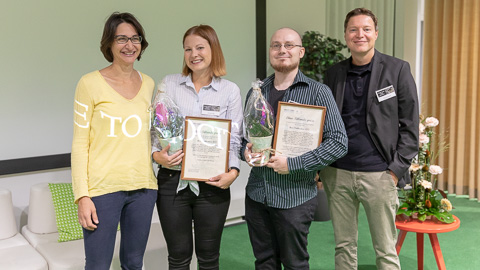Elias Tillandz Prize 2017 Awarded to Two Research Groups in BioCity Symposium
This year, the Elias Tillandz prize for the best scientific paper published in 2017 in BioCity Turku was awarded to two research groups. The prize was presented on Thursday, 23 August 2018.

Postdoctoral Researcher Maria Georgiadou (left) and Doctoral Candidate Johanna Lilja from Johanna Ivaska’s research group and Professor Tero Aittokallio (right) and Doctoral Candidate Teemu Daniel Laajala from his group accepted the prize.
he best publication prize of BioCity Turku has been named after Professor Elias Tillandz (1640–1693) who was the first empirical life scientist in Turku. Elias Tillandz has also been considered to be the father of botany in Finland as his botanical study was the first academic publication written in Turku in 1673.
The prize includes a grant and the awarded publications have been selected by the Scientific Advisory Board of BioCity Turku. The prize has been supported by Åbo Akademi University Foundation.
Crowdsourcing Better Prostate Cancer Prediction Tool
A research team led by the University of Turku scientists developed a winning machine-learning model for predicting overall survival of patients with metastatic castrate-resistant prostate cancer (mCRPC) which accounts for one third of all prostate cancer patients with metastatic disease.
Although a number of options exist for treatment of mCRPC, the impact of these treatments has been modest in terms of overall or disease-specific mortality in the past 20 years. The primary objective of this crowd-sourcing DREAM Challenge was to establish new quantitative benchmarks for prognostic modelling in mCRPC, with a potential impact for clinical decision making and ultimately improving the design of future clinical trials.
– The results demonstrate the benefits of sharing clinical patient data and how machine learning can identify combinations of clinical features most predictive of individual medical outcomes from patients’ clinical data, Professor Tero Aittokallio explains.
The winning team combined researchers with various expertise from the University of Turku, Institute for Molecular Medicine Finland (FIMM), and Helsinki University Hospital. This multi-disciplinary team put their heads together and brought in their own expertise to improve the collaborative solution.
The work has been conducted in the research group of Professor Tero Aittokallio, at the University of Turku, Department of Mathematics and Statistics.
>> Guinney, Wang, Laajala et al.
Prostate Cancer Challenge DREAM Community. 2017.
Prediction of overall survival for patients with metastatic castration-resistant prostate cancer: development of a prognostic model through a crowdsourced challenge with open clinical trial data.
https://dx.doi.org/10.1016/S1470-2045(16)30560-5
Researchers Discovered Unexpected Link between Cancer and Autism
– Amazingly, the ability of cancer cells to adhere and migrate on their environment and invade into surrounding tissue were prevented by SHANK protein – a molecule previously studied in the central nervous system and linked to autism, describes Doctoral Candidate Johanna Lilja.
In cell culture experiments, the researchers found that SHANK protein limits the ability of a protein called Rap1 to activate cell adhesion receptors, integrins. This same mechanism regulated cancer cell motility as well as the morphology and branching of neurites, known to be essential for normal brain function.
– The same factors can regulate cell shape and adhesion in very different cell types. Our results revealed that gene mutations in SHANK, found in autistic patients, impair its ability to prevent the adherence of both neurons and breast cancer cells. This once again demonstrates the power of basic research in facilitating our understanding of several human diseases, rejoices research group leader Johanna Ivaska.
The research team and their collaborators are currently assessing if SHANK proteins have other impacts on cancer cells – especially on their proliferation.
The research has been conducted in Academy Professor Johanna Ivaska’s research group at Turku Centre for Biotechnology.
>> Lilja et al.
SHANK proteins limit integrin activation by directly interacting with Rap1 and R-Ras. https://dx.doi.org/10.1038/ncb3487
TJ/MR
Photo: Antti TArponen